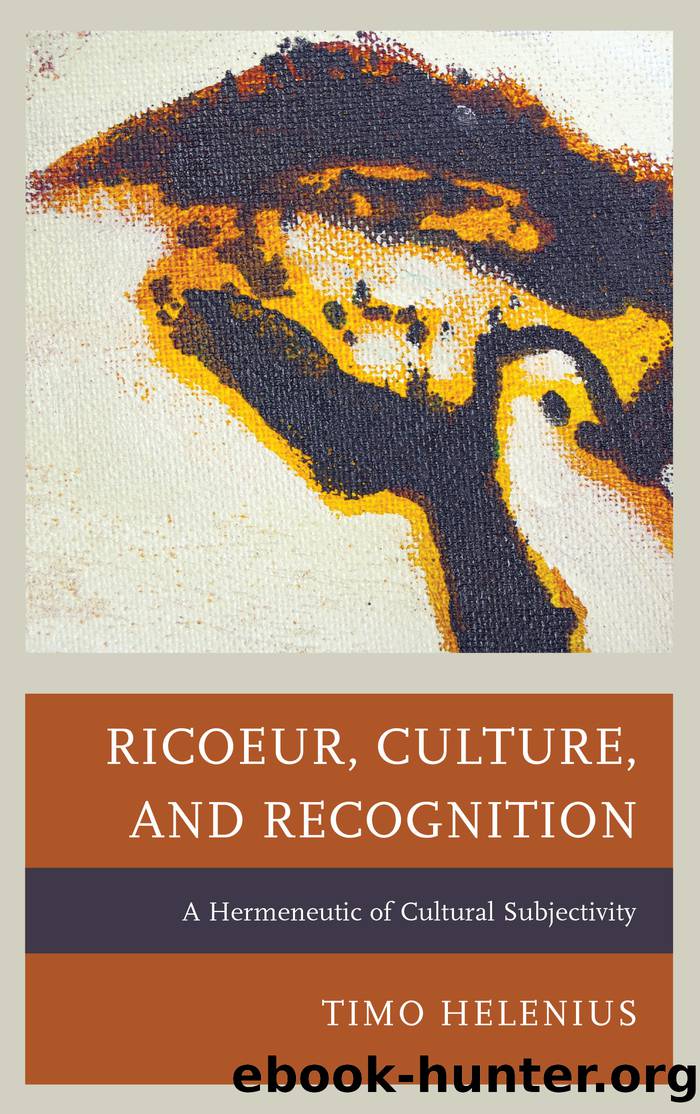Ricoeur, Culture, and Recognition by Helenius Timo;

Author:Helenius, Timo;
Language: eng
Format: epub
Tags: undefined
Publisher: Lexington Books/Fortress Academic
Published: 2012-08-15T00:00:00+00:00
The Quest for Having
The search for the cultural constitution of the self begins by acknowledging that before being able to discuss human alienation one would have to presuppose a self âhavingâ itself. Ricoeur, in other words, assumes that the primal identity is formed in self-objectification, or making oneâs self a primordial economic object: âthe âIâ constitutes itself by founding itself on a âmine.ââ[62] This grounding notion of an economic object, or an object of economic interest, also differentiates the properly human needs from the animal âsimple needsâ that are directed toward natural objects, and for which the correlative feeling is an oriented lack, as Ricoeur defines the shortage of sustenance indicated by instincts. In contrast to natural objects, an economic object is âan available goodâ (un bien disponible) that according to Ricoeur is characterized by its very availability âfor me.â[63] The affective interiorization of the external relation between the âIâ and the economic object is a correlate of this mode of relating.
Ricoeur restates, however, the distinction between animal environment and the human world in terms of work. According to Ricoeur, a human being is distinguished from the other animals because the essence of his or her needs is different, and the difference between these needs is itself brought about by human production in the form of establishing an economic relation to things, that is, treating natural objects as possessions. Consequently, Ricoeur defines a human being again as the Working Human: âA human being, because he produces his subsistence, is a being who works.â[64] In Ricoeurâs analysis, it is the working human who establishes this economic relation to things. Natural objects thus become possessions that connote control and dependence, and which therefore also imply certain âothernessâ in the very form of the object on which a human subject makes him or herself dependent. This otherness reintroduces the idea of a shattered ego; the possibility of no-longer-having (ne-plus-avoir) forms a breach in the constitution of the economic âIâ who works to have and to gain sustenance.
For Ricoeur, having also defines interpersonal relations. Possessing distinguishes the âIâ from another âI,â since excluding âmineâ from âyoursâ differentiates the âIâ and the âyouâ in relation to their respective spheres of belonging, or contexts of having. Reiterating the analyses of The Voluntary and the Involuntary Ricoeur thus states that oneâs body is an occupied spatiality by which one enters into the world of things as economic objects. In other words, Ricoeur maintains that goods and commodities of all kinds pertain to me in this body which is the nexus of my spatial occupation. The economic human is, therefore, primordial and passionate about having; âI cannot imagine the I without the mine, or human being without having,â[65] Ricoeur concludes.
Download
This site does not store any files on its server. We only index and link to content provided by other sites. Please contact the content providers to delete copyright contents if any and email us, we'll remove relevant links or contents immediately.
The remains of the day by Kazuo Ishiguro(8378)
Tools of Titans by Timothy Ferriss(7805)
Giovanni's Room by James Baldwin(6803)
The Black Swan by Nassim Nicholas Taleb(6761)
Inner Engineering: A Yogi's Guide to Joy by Sadhguru(6438)
The Way of Zen by Alan W. Watts(6287)
Asking the Right Questions: A Guide to Critical Thinking by M. Neil Browne & Stuart M. Keeley(5353)
The Power of Now: A Guide to Spiritual Enlightenment by Eckhart Tolle(5329)
The Six Wives Of Henry VIII (WOMEN IN HISTORY) by Fraser Antonia(5234)
Astrophysics for People in a Hurry by Neil DeGrasse Tyson(4998)
12 Rules for Life by Jordan B. Peterson(4159)
Housekeeping by Marilynne Robinson(4057)
The Ethical Slut by Janet W. Hardy(4036)
Skin in the Game by Nassim Nicholas Taleb(3965)
Double Down (Diary of a Wimpy Kid Book 11) by Jeff Kinney(3921)
Ikigai by Héctor García & Francesc Miralles(3888)
The Art of Happiness by The Dalai Lama(3844)
Skin in the Game: Hidden Asymmetries in Daily Life by Nassim Nicholas Taleb(3720)
Walking by Henry David Thoreau(3681)
